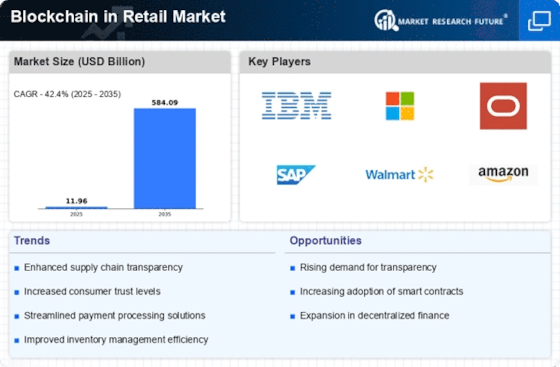Top Industry Leaders in the Blockchain in Retail Market

Competitive Landscape of Blockchain in Retail Market: A Look at Key Players, Strategies, and Trends
The retail industry is witnessing a significant transformation, driven by the emergence of blockchain technology. Its potential for enhancing transparency, traceability, and efficiency across the supply chain is attracting major players and new entrants alike, creating a dynamic and evolving competitive landscape.
Key Players:
- Tata Consultancy Services Limited (India)
- Microsoft Corporation (US)
- BlockApp (US)
- Oracle Corporation (US)
- Amazon Web Services (US)
- Bitpay (US)
- Guardtime (US)
- Microsoft Corporation (US)
- Bitfury USA Inc. (US)
- Cognizant (US)
- Cisco Systems (US)
Strategies for Market Differentiation:
- Specialization: Players are focusing on specific niches within the retail blockchain landscape. For example, VeChain excels in tracking luxury goods, while Skuchain focuses on omnichannel inventory management.
- Partnerships and Collaborations: Strategic partnerships are crucial for building robust ecosystems and offering comprehensive solutions. Retailers are collaborating with technology providers, logistics companies, and other stakeholders to unlock the full potential of blockchain.
- Subscription-based Models: Software-as-a-service (SaaS) models are gaining traction, offering retailers flexible and affordable access to blockchain technology.
- Innovation and Customization: Players are constantly innovating and developing new applications for blockchain in retail. Customization is key to addressing the specific needs and challenges of different retailers.
Factors for Market Share Analysis:
- Target Market: The focus on large, medium, or small retailers significantly impacts market share. Players serving niche segments within retail, like luxury or grocery, also carve out distinct niches.
- Technology Stack: The underlying blockchain platform used (e.g., Ethereum, Hyperledger) can influence adoption, integration, and scalability.
- Service Portfolio: The breadth and depth of services offered, from consulting to platform development and ongoing support, can attract different segments of the market.
- Industry Expertise: Players with deep understanding of the retail industry and its specific challenges can tailor solutions and gain an edge.
New and Emerging Companies:
- Retail-specific blockchain platforms: Startups like B2C2 and TradeLens are developing platforms specifically designed for retail supply chains, offering pre-built functionalities and ease of use.
- Decentralized marketplaces: Blockchain-based platforms like OpenBazaar and CargoX are emerging, aiming to disrupt traditional retail models by empowering peer-to-peer transactions and direct connections between brands and consumers.
- Sustainability-focused solutions: Blockchain is increasingly used to track the environmental and ethical sourcing of products, with startups like Provenance and Sourcemap leading the way.
Current Company Investment Trends:
- Increased R&D spending: Major players are investing heavily in research and development of new blockchain applications and solutions for retail.
- Acquisitions and partnerships: Strategic acquisitions and partnerships are accelerating, aiming to expand capabilities and reach new customer segments.
- Pilot projects and proof-of-concepts: Many retailers are still in the early stages of exploration, conducting pilot projects and proof-of-concept demonstrations to assess the value proposition of blockchain.
- Focus on data and analytics: Integrating blockchain with data analytics tools is gaining traction, enabling retailers to gain deeper insights from their supply chains and improve operational efficiency.
Latest Company Updates:
Walmart Tests Blockchain for Food Traceability (October 25, 2023): Retail giant Walmart announced a pilot program using blockchain to track pork from farm to fork. This aims to increase transparency and food safety within its supply chain.
Carrefour Launches Blockchain-powered Loyalty Program (October 20, 2023): French supermarket chain Carrefour has launched a loyalty program based on blockchain technology. The program rewards customers with tokens they can use for discounts and other benefits, stored securely on a blockchain platform.
Nestle Partners with IBM to Track Seafood Sustainability (October 18, 2023): Food giant Nestle has partnered with IBM to use blockchain to track the sustainability of its seafood supply chain. This project aims to verify the origin and fishing practices of the seafood it sources.










